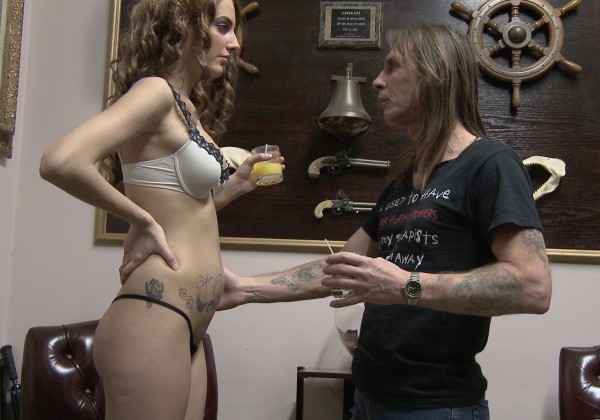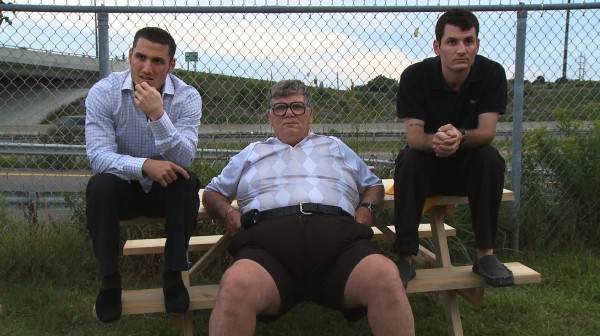
In one of this film’s first scenes, a manager tells a stripper “I’m fining you $20 because I’m so pissed at you,” while handing her a $40 payment for a shift. She tells him she was scheduled for one shift, she showed up for it and he couldn’t “fine her” or withhold her pay. “I can do whatever I want,” he says. 90 seconds in, and I already have a grudge against the people running this strip club.
Director Shawney Cohen tells us that The Manor, which opened the 2013 Hot Docs film festival in Toronto, is not a documentary about the titular strip club—it is about his family. Shawney’s parents bought the Manor, a combination strip club/downmarket residential hotel in Ontario, when he was a child, and now it’s run as a family business with their two adult sons. The film is more mystifying than revealing, as it cites connections between family disorder, dysfunction and the running of a strip club which are never really clarified.
The overriding visual image in The Manor is the juxtaposition of the eating disorders suffered by his parents, Roger and Brenda Cohen. Roger weighs in 400 pounds, and even with surgical intervention cannot get below 300. Brenda weighs 85 pounds and spends most of the movie preparing an all-you-can eat-buffet for her family. Younger brother Sammy Cohen apparently loves nothing better than managing this strip club (power to him except for ripping off strippers for their shift pay—not cool, dude). Sammy’s girlfriend is a blond bartender who rubs herself with body lotion while behind the bar (poor judgement there), and finally there is Bobby, a protégée of Roger’s who has a long list of criminal convictions (including a charge of domestic violence that emerges during filming) and who gravely instructs a dancer not to let customers put their hands down her pants.
Poor Shawney, we learn, does not fit in. There have been so many “unlikely” stripper stories that I have an automatic reflex of “bitch, please. Get over yourself.” This could be the first “unlikely strip club manager” story I’ve ever seen, but my reaction is still pretty much “bitch, please, get over yourself.” These “unlikely” narratives subtly despise all the people around them who take the work seriously. Shawney dreams of finer things than managing a strip club, but as he would have to “burn the place down to get fired,” he has no incentive to do a good job. While his brother meets “the wrong type of women,” Shawney dates an artist from Toronto who tries desperately to explain why she likes living downtown Toronto without insulting suburban Guelph, and finds she can’t. Besides her tendency to put on moisturizer behind the bar, Sammy’s bartender girlfriend seems nice enough to me, and she is the one engaged enough to notice that Brenda was abusing laxatives. Maybe she was eating babies off camera?
The film is about a dysfunctional family who own a strip club but the club is talked about only in general terms. There are dark, unarticulated suspicions that Brenda’s eating disorder is a result of her husband’s business, but there is little to buttress that suspicion. There is an overwhelming sense of patriarchal entitlement from Roger; he says that he wants his wife to seek psychological help for her eating disorder, but after she agrees, he refuses to pay for it. Shawney takes his mother to a therapist for a single session; when Brenda finds out that Roger hasn’t paid for it, she refuses to go back. Compared to the healthy sum Roger spent on his own weight loss surgery, therapy seems like a bargain. He browbeats his sons for not being sufficiently knowledgeable about the business, asking “what would you do if I wasn’t here?” He is right, of course—there is no indication in this film that either of his children are equipped to compete for jobs in any place that isn’t owned by their dad.

Shawney has clearly drawn some connections between owning a strip club and his parents’ complementary disorders, but the film does virtually nothing to explicate these. He asks his mother about her feelings on the strip club and she replies that it used to bother her to hear her husband talking about women “like pieces of meat; good pieces of meat and bad pieces of meat.” But, she says, that was a long time ago. Treating women like meat, it is implied, is a necessary part of the business. Indeed, aside from brief, humiliating encounters with management, the strippers in this film are just occasional backdrop. Oh look—boobs! (But you don’t get boobs on a constant basis—the boobs are withheld and then dropped in suddenly, presumably to keep our interest. It’s an intermittent reward!)
I spent a lot of this movie commiserating with the dancers we saw sporadically on the screen, and as a result my laughter was not really in sync with the laughter of the rest of the audience. As the film opens, Shawney reminisces about his 13th birthday, when his father bought him a lapdance. This got a huge laugh from the audience, while I looked around wondering if everyone was crazy. I turned my mind to the mechanics of performing a lapdance on a thirteen year old boy and found it not funny at all and really kind of gross. I did, however, find it a tad funny that Roger gets terribly upset at the prospect of illegal drugs being sold and/or consumed in his club, but was apparently okay with violating any number of criminal law regarding the sexual touching of minors.
Looking at the security camera in the changeroom (nice, guys! Is there one in the bathroom that we can see, too?) 400-pound Roger refers to a slightly overweight dancer as a “beached whale” and instructs the staff to “hide her somewhere.” This gets another big laugh, while I think “God, what a dick.” I wonder later if Shawney told her how he was using her in this film, because if he got her to agree to this, he’s a genius at something. I wonder how much money she made that night. Did the customers agree? We don’t know. Nobody cares about the dancers. (Just like a real club! I feel at home already.) If it means anything: I thought you were pretty, overweight dancer. That guy was a douche. Roger slaps a dancer in the face with a handful of money she handed him because she walked into his office wearing nothing but her thigh-highs. It’s almost like (as the young lady points out) she is in a strip club or something. She and the audience laugh good humouredly about it. I don’t.
I’m sure Shawney would agree that we are all integrally shaped by our experiences, and (like Shawney) I have a lot of experiences in a stripclub—it therefore doesn’t shock me that the people who own and run strip clubs get married and have children. If you aren’t shocked by this notion that “people who own strip clubs are people too,” we’re really only watching his family’s dysfunction like some kind of mental-illness porn. That is not the porn I’m into, and as a result, I’m most attentive to snide, off hand remarks, and the unthinking arrogance that is so reminiscent of so many male strip club employees. In the end, far from taking any real emotional insight into his family and the effect of owning this business on a complex family dynamic, I left the theatre with a pretty strong feelings that these people would SUCK to work for. The movie ends, if I may spoil a documentary, in stasis. Shawney notes that there is no growth and no change. Bobby’s recent criminal charges are dismissed. His parents’ eating disorders are unchecked and his brother still loves working in a stripclub, where he himself, he says self-deprecatingly, still works.
The Manor will be screening at Toronto’s Bloor Cinema May 10-16. Director Shawney Cohen will participate in a Q&A after the screenings on May 10th and 11th.
So, I liked this better than you did in part because I thought Bobby was a hoot. Until the domestic violence charge. Agreed that Shawney sees himself at a distance but I think he’s fairly honest about his own shortcomings and doesn’t think he’s too good to be there, rather that he’s just coasting. It is disappointing and low-drama that it ends with no real changes, but that is true to life. And he doesn’t try to present his dad as anything other than he is, which is a sexist, old-country fat fuck.
Same on wondering about how they got the dancers’ permissions.
My mom worked in strip clubs throughout my childhood. She cocktailed. She ended up marrying a cousin of a club owner with whom she had worked for many years (the club owner, not the cousin.) And via that marriage, I was for a few years part of this big extended family of Persian strip club owners, and by extension the community of strip club owners and workers in our city.
AND THEY WERE A MESS.
There really is something to an assertion that strip club families are dysfunctional families. I think maybe it is because the constant exposure to the business blurs the lines of appropriateness. I was “asked” (read: bullied into) to come in and waitress in the club when I was only 16; that could have brought the club down and also left me with a felony conviction. My sister was offered jobs in the club too, when she was a minor. There is this weird idea that because you’re family, it isn’t a big deal to expose kids to this stuff. But imo it is a big deal.
I think also that the cultural more of club owners marrying dancers creates an environment of competition. The owner marries a dancer, and she has won the stripper lottery, but coming into a marriage that way smacks of winning a beauty contest: she has always to look out for less-scrupulous strippers who think they can be her replacement, and she can’t be sure that they aren’t right. And it rubs off on their daughters, and so does the strange double standard of the business, which is that it is ok for other women to be strippers, but it sure as shit isn’t ok for YOU, my daughter, to be a stripper. Even though your mom was.
It is weird and messy and I do see a connection even if the filmmaker was not able to communicate the connection well.
Sorry, I’m still stuck on lap dance to 13 year old boy.